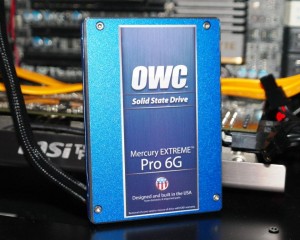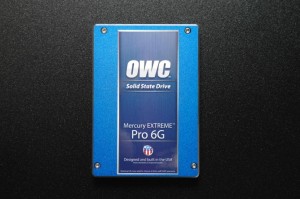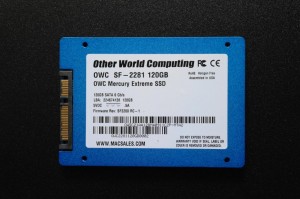
An SSD arrived earlier today that I thought all might like to read about. A quick change of plans to the negative of a few and here we are taking pictures and benchmarking the new OWC Mercury Extreme Pro 6G 120GB SSD.
Having just completed testing, OWC gets a big thumbs up for being only the second manufacturer to release an SSD with SandForces new SF-2000 series SATA 3 processor as well as ensuring the ’6G’ is of the quality that we have come to appreciate.
INTRODUCTION
(MB994SP-4S)The OWC Mercury Extreme Pro 6G SSD is a SATA 3 solid state drive and available in capacities of 120, 240 and 480GB. Initial pricing is expected to be in the area of $319.99 and $579.99 for the 120 and 240GB versions with the 480GB demanding a premium of $1799. Performance for the 6G is equal for all capacities at 506MB/s read and 464MB/s write with 60,000 IOPS and .1ms disk access.
 Exterior packaging of the OWC ’6G’ is just as we should be seeing with all SSDs. The exterior plastic case affords a great view of the drive inside and the plastic opens easily without the need for scissors and a great deal of frustration as is the case with the 1 piece plastic packaging so common these days.
Exterior packaging of the OWC ’6G’ is just as we should be seeing with all SSDs. The exterior plastic case affords a great view of the drive inside and the plastic opens easily without the need for scissors and a great deal of frustration as is the case with the 1 piece plastic packaging so common these days.
PHYSICAL CHARACTERISTICS
The exterior of the OWC 6G is solid metal with smoothed edges and the distincive OWC blue color. The sticker on back identifies the SandForce SF-2281 processor within, firmware revision as well as the typical warning that any tampering or removal of the seal will automatically void the warranty. Thats why we like to get a close up look at the heart of the 6G here.

 Inside the OWC Mercury Extreme Pro 6G 120GB SSD lies the best in solid state drive technology today. The controller is the SandForce 2281 SATA 3 controller and RAM is 16 chips of 8GB 25nm Synchronous Tier 1/Grade A NAND for a total raw capacity of 128GB. The firmware, however, allocates 7% (1x8GB chip) of storage to over provisioning which improves the lifespan and performance of the SSD. This brings the total available to 120GB which is then formatted leaving the final available user capacity at 111GB.
Inside the OWC Mercury Extreme Pro 6G 120GB SSD lies the best in solid state drive technology today. The controller is the SandForce 2281 SATA 3 controller and RAM is 16 chips of 8GB 25nm Synchronous Tier 1/Grade A NAND for a total raw capacity of 128GB. The firmware, however, allocates 7% (1x8GB chip) of storage to over provisioning which improves the lifespan and performance of the SSD. This brings the total available to 120GB which is then formatted leaving the final available user capacity at 111GB.
A little known characteristic that demonstrates just how advanced technology has become is evident if a cell or block goes bad within the SSD. The SSDs firmware will automatically recognize the problem, designate the equal amount of space from the over provisioned area and then simply remap without any capacity or data loss.



No comments:
Post a Comment